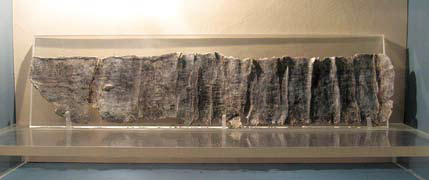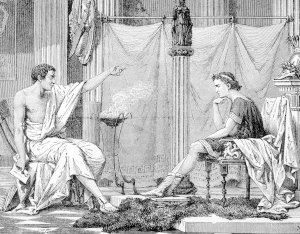Alexander had full conscience and awareness of his contribution to the Greek continuation and eternity. He himself transferred learning, culture and the Greek way of life. He created educational centres, schools, where the basic reading for the students was Homer. As for thousands of years, before and after him. Since, the before Alexander period up to the Eastern Roman Empire.
In Persia children reported Euripides and Sophokles and in Egypt a handbook was written for teaching Greek as a foreign language, based on Iliad and Achilleas’ achievements.
As Ploutarhos writes ” they chose 30.000 children and gave orders for them to learn Greek and to be trained in the Macedonian army class, and appointed many supervisors “.
The knowledge of the Greek language helped young citizens of the empire. It is visible till today in several regions of the empire on this spiritual heritage and culture, consequence of Greek education to a point where researchers are suprised of Alexander’s course and journey. All this revealed a kingdom with deep knowledge of its origin and culture. Parallel to this, his faith in the Greek values did not influence his respect for the Egyptian, Babylonic and Indian ideas.
The Iliad, the poetry of Pindar, the work of the huge tragedies strengthened the sense and realism, they gave him provision, as a leader of the world tranferred them to the citizens of the empire.

Sign with names of Macedonia, names of people, cities, gods, rivers, places.
Education was a desire he wanted every citizen of the Macedonian nation to have, whilst Alexander was one of the fifth teenagers, chosen sons of Macedonian. The chosen of the yard studied for four years, they received military education as horse riders and academic education in grammar, rhetoric, dialect, geometry, arithmatics, astrology and music. At 14 they would attend the School of Royal Followers, the chosen Macedonian Teenagers. The school was well-known as the educational centre of leaders and generals and Alexander had already done the practicality in all the individual subjects of the school.
His supporters and inspirers in the meaning of Greek education was his grandmother Euridiki and his mother Olympias. His grandmother Eurydice-Queen mother, to whom they respected, had offered altazes to the capital, Aegae, to Efkleia ” the good fame ” which was Alexander’s guide. Eurydice had composed the inscription that accompied the offering towads the Muses: ” Eurydice, daughter of Sirra offers this (to Ermi) to the Muses of the cities, because from her soul has passion for learning. Fortunate mother of grown up children took care that registers would learn to write down the oral speech “.
Alexander was devoted to the Muses. It was characterized that after eight months of absence, when he repressed the rebellion to Thiva, the festival at Aeges went on for nine days, each day was offered to one of the nine Muses.
 But his great teacher was Aristotle, the man that influence Alexander, and of course his education. Alexander attended Aristotle’s school at Mieza, at the sacred landscape of the Doric and with other children, offspring of men, accepting the opinion of Aristotle in Cosmology, Geography, Botany, Zoology and Medicine that is why he took scientist with him when he was on a campaign to Asia. The Macedonian king was stunned by the lectures by Aristotle in Logic, Metaphysics, Ethics, Philosophy, Dialectic, Rhetoric, Economy, Physics, Medicine and Geography. When they finished the lessons, Aristotle gave Alexander a hand-written papyrus with the Iliad, which Alexander never parted from. He often said that ” I owe my life to my father, but I owe my well-living to my teacher. “
But his great teacher was Aristotle, the man that influence Alexander, and of course his education. Alexander attended Aristotle’s school at Mieza, at the sacred landscape of the Doric and with other children, offspring of men, accepting the opinion of Aristotle in Cosmology, Geography, Botany, Zoology and Medicine that is why he took scientist with him when he was on a campaign to Asia. The Macedonian king was stunned by the lectures by Aristotle in Logic, Metaphysics, Ethics, Philosophy, Dialectic, Rhetoric, Economy, Physics, Medicine and Geography. When they finished the lessons, Aristotle gave Alexander a hand-written papyrus with the Iliad, which Alexander never parted from. He often said that ” I owe my life to my father, but I owe my well-living to my teacher. “
The Macedonian King had shown from a very young age his charisma and Aristotle hoped to guide the future king to his duties, as his teacher, Plato, tried to guide Dionysias the younger as leader of Syracuse. For this reason Aristo wrote f an essay for Alexander ” About the king ” which unfortunately was not saved. Aristotle’s influence on Alexander was admittedly catalytic. The strength of the mind, the thoughts, the spirit was thought to be the greatest symbol of the great Greek teacher to the most significant personality in the ancient world.


